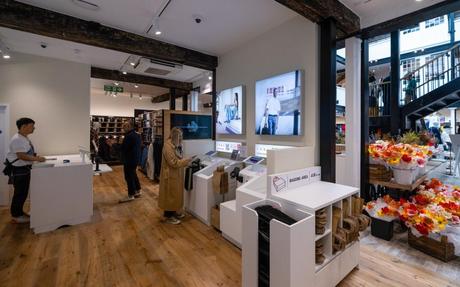
A sultry Thursday afternoon in Wimbledon might not seem like the perfect time to buy wool trousers and fluffy jumpers. However, there were a few suitors at Uniqlo.
Olivia, a 23-year-old Londoner, was buying a few cardigans for the fall so she would be "prepared" for when the weather got colder.
At Uniqlo, questions aren't just about when customers will buy for each season, but how. The Japanese fast-fashion brand has installed self-service checkouts in all of its stores, mimicking the controversial technology introduced in supermarkets.
Unlike supermarkets, however, customers don't have to scan barcodes. Simply drop items into the self-checkout's built-in bucket and the futuristic technology automatically registers them. Uniqlo claims the system can cut transaction times in half.
It's not the only fashion retailer to emulate supermarkets. Self-checkouts are being installed in stores across the high street. Marks & Spencer, Primark and Zara - some of the early adopters - have expanded their use of the technology, while others such as JD Sports are starting to introduce self-checkouts.
The embrace comes despite doubts about the technology emerging in the supermarket sector, which was the first to embrace the checkouts. Both Asda and Morrisons have begun to curtail their use of the technology in recent months.
Booths, a northern rival to Waitrose, ditched them altogether last year, saying: "Colleagues serving customers makes for a better customer experience." In the US, retailers including Target have also begun removing checkouts amid concerns about shoplifting.
Between the end of 2020 and 2023, the number of self-checkouts in UK stores rose from 65,000 to almost 90,000, according to figures from RBR Data Services, a division of Datos Insights. Much of this growth was driven by fashion retailers, rather than supermarkets.
"It's become increasingly popular with our shoppers," says Paul Orange of JD Sports. Following a trial at its store in Bluewater, Kent, the company has now installed the technology at three of its sites. "For us, it's as much about our customers getting used to self-checkouts as it is about us embracing the technology," says Orange.
Click here to view this content.
JD Sports is currently monitoring customer feedback before deciding whether to roll out the technology further.
At M&S, bosses have announced plans to install self-scan checkouts at dozens of other stores to "offer customers new ways to pay, making shopping at M&S quicker, easier and more convenient".
However, the company, perhaps aware of the potential negative reactions, said customers will still have the option to pay at manned checkouts.
There is some skepticism among retail experts. Companies may say their customers want choice, but experts believe the real motivation for installing self-checkout is cost savings.
"It's about labor costs," says Shore Capital analyst Clive Black. "I think that's the driver."
Many shop workers are on the minimum wage, which saw its biggest ever increase in April, from £10.42 to £11.44 an hour. A further significant increase is expected to be announced in the autumn.
"Labour costs have risen dramatically over the last five years, particularly in the UK, so it's important to look at how many people you employ and where you have them in your stores," Black said.
Following the pandemic, many lower-paid sectors, including retail and hospitality, also struggled to recruit staff, due to record unemployment and the exodus of EU workers during Covid.
Primark says in its annual report that self-checkout technology can help "ease the recruitment pressures businesses face in a tight labour market".
The terminals "give colleagues the space to focus on where they are needed most - for example, restocking the shop floor, helping customers or staffing fitting rooms".
However, implementing self-service checkouts can also come with challenges. Retail crime rates are at a 20-year high, and monitoring thefts can be more difficult when employees are no longer at the checkout.
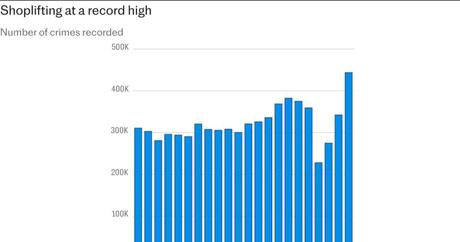
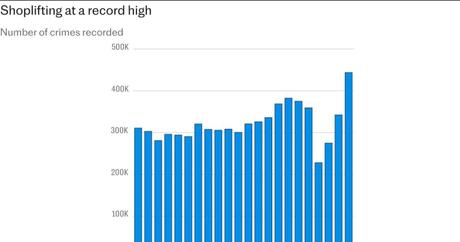
Survey data suggests that shoplifters are up to 21 times more likely to push items past a machine than a staff member. A report from Ipsos earlier this month [August] revealed that one in eight adults have admitted to throwing away items for cheaper alternatives when using self-service checkouts. It's a scam known as the "banana scam".
In supermarkets, such scams may not generate a large loss. But in retail, much more valuable items can be targeted.
Many fashion retailers are investing in high-tech stores that use RFID (Radio Frequency Identification) chips in price tags to ensure that customers do not sell the items as cheaper alternatives.
These chips are automatically read by the self-service machines when customers insert them into the station. In theory, this should eliminate any risk of people pulling the "banana trick."
Still, no system is perfect. Bloomberg claimed last year that Zara had been forced to delay the rollout of the system after discovering that the chips were easy to identify and remove. Owner Inditex played down any problems, saying the rollout had "proceeded according to plan without any major incidents."
Christopher Andrews, an associate professor at Drew University who has written about self-checkout systems in grocery stores, says people will always be at the center of any system designed to deter theft.
"An RFID scanner on a garment is only effective if there is a way to prevent the customer from leaving the store after the security alarm has gone off," he says.
Employing cashiers can have more benefits than just deterring scammers and thieves.
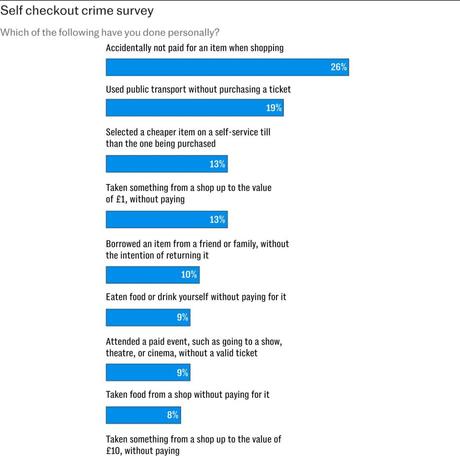
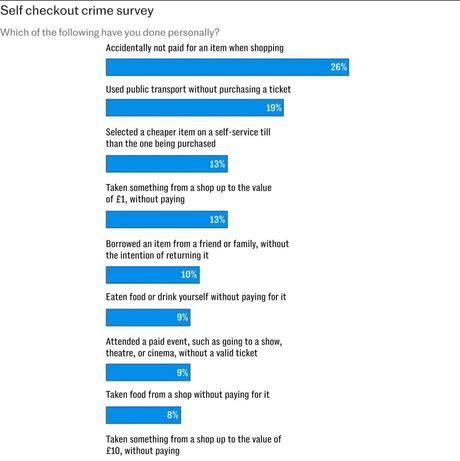
James Daunt, who runs Waterstones, says his business is "completely dependent on our booksellers and the service they provide for the quality of our bookshops".
He adds: "Machines will never replace them, whether they are self-service checkouts or information terminals."
Campaigners say it is vital that customers can still find a store assistant who can help them, especially when it comes to older customers.
"They want to have a friendly face in the shopping experience," says Dennis Reed of the senior group Silver Voices. "If it's so dehumanizing, why would people go to stores? They might as well order online."
It's not just older people who are lukewarm at best about self-checkout machines.
Back in Wimbledon, West London, Gen Z Olivia queues to be served by a shop assistant. Most of the high-tech stations remain empty. One is surrounded by a group of middle-aged women, staring anxiously at a receipt. "It's probably not the most seamless system yet," Olivia shrugs.
